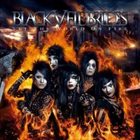 1.75
1.75 |
14 ratings

Wilytank
A dialogue exchange regarding Black Veil Brides' 'Set the World on Fire' and the general mallcore scene:
Metal Music Connoisseur: "Hey, music store clerk. My copies of Fleshgod Apocalypse's 'Agony' and Origin's 'Entity' both got worn out from being overplayed. Got any copies that I could replace them with?"
Music Store Clerk: "'fraid not, son."
MMC: "God fucking dammit. Okay, got anything new in stock for me to check out?"
SC: "Well, the new Black Veil Brides album 'Set the World on Fire' just came in a few days ago."
MMC: "Never heard of them."
SC: "Here, check them out." *hands Connoisseur a copy of the album*
MMC: "Um...is this what the band really looks like? Because they seem rather...flamboyant."
SC: "Quit being so closed minded, buddy. Give them a listen. All the kids today seem to like them."
MMC: "You know what? I'm going to give them a listen tonight at home on Grooveshark. If I like them, I'll come back and buy a copy." *hands the Clerk back the CD and leaves*
-The Next Day-
MMC: "Hey, you remember that Black Veil Brides album that you recommended to me yesterday?"
SC: "Yeah. Did you listen to them? "Pretty good shit, right?"
MMC: "Um, no. They're pretty fucking lame."
SC: "Aw, what didn't you like about them?"
MMC: "Well, they sound like one of those shitty glam rock revival bands mixed with Avenged Sevenfold. Meaning, you've got a try-hard hard rock band that tries to make themselves sound impressive by having double kick drums and fast paced guitar solos, but all the while they still sound generic as hell."
SC: "And what the hell is wrong with double kick drums and fast paced guitar solos? Metalheads usually like them."
MMC: "Dude, I came in here yesterday asking for Fleshgod Apocalypse and Origin. These people in Black Veil Brides have nothing on Paul Ryan, John Longstreth, or Francesco Paoli. There is nothing new or impressive about the musicianship in Black Veil Brides."
SC: "But you gotta admit that the vocalist has some talent."
MMC: "Yeah, he sounds like every other modern mallcore hard rock singer, meaning he's got that whiny tone that people like me fucking hate. Then, screamo type screaming gets mixed in."
SC: "Look, buddy. Maybe you need to open your mind up to new things every once in a while."
MMC: "Look, dude. Maybe you need to understand that not everyone likes this type of shit."
SC: "Well, yeah, but that doesn't mean you can go around saying that."
MMC: "What the hell are you talking about? You and I are the only two characters in this dialogue, and you even asked for my opinion. But I am prepared to share my wisdom and tell everyone who hasn't heard of Black Veil Brides to stay away from them." *leaves*
That night, the Metal Music Connoisseur discovered Amazon.com where he could find CDs for cheaper prices than the Music Store and with a far better selection. He lived happier ever after.
'Set the World on Fire' was not enjoyable to listen to. I advise everyone to not listen to it, especially if you hate Avenged Sevenfold.